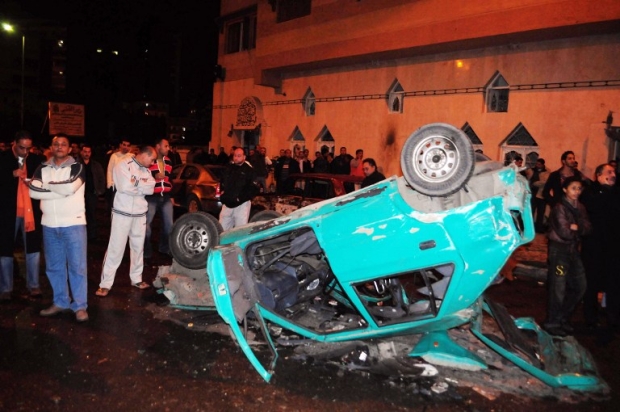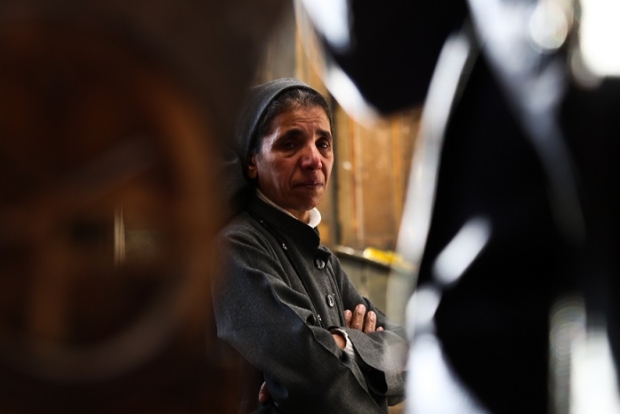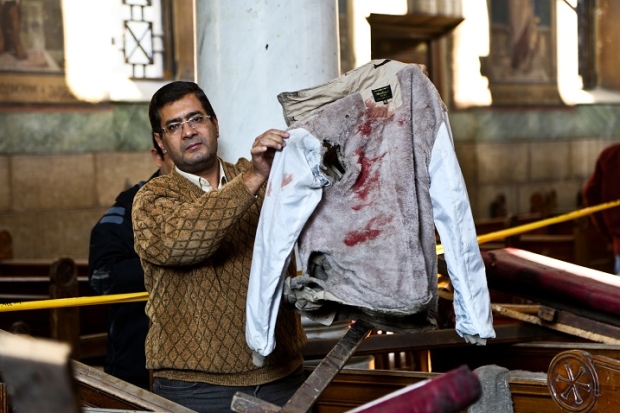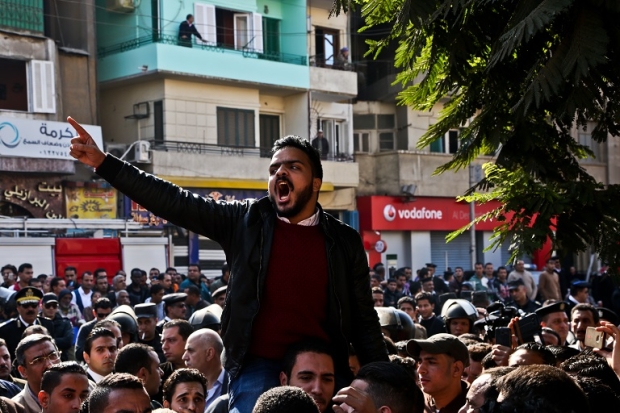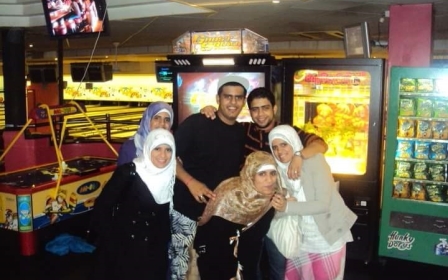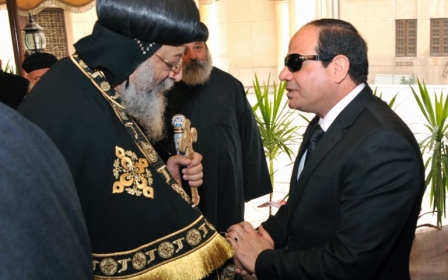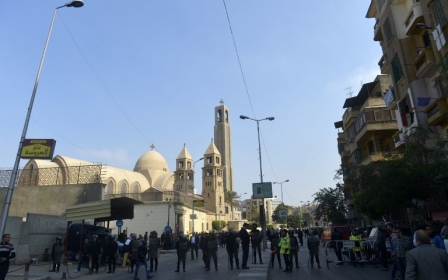Egypt's church bombing and the monsters in Sisi's closet
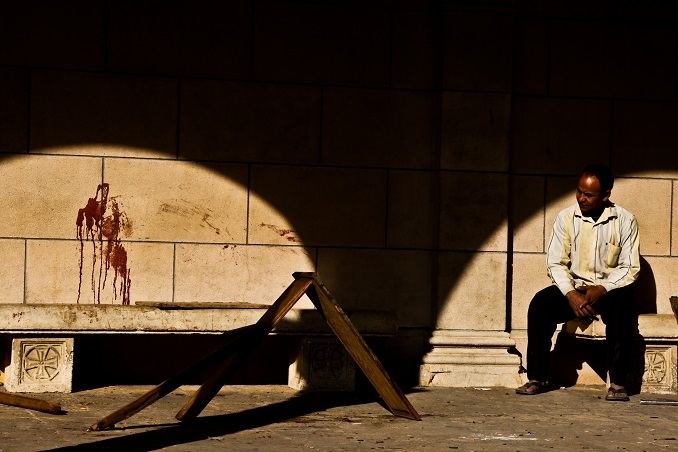
It has been more than three years since Egypt’s president Abdel Fatah al-Sisi asked for carte blanche to fight terrorism.
If the dead could speak, they would say: "You promised us citizenry and all we have found is misery."
Fast forward to 9:50 AM last Sunday and 25 Egyptians, mostly women and children, were murdered by what authorities believed to be a 12 kilogram TNT charge or a suicide belt.
The attack, the third in a trilogy that saw the deaths of six policemen in Giza and one civilian in Kafr el-Sheikh, 48 hours earlier, is a devastating indictment of a regime, which stands on the precipice of a long and slippery slope.
If the dead could speak, they would say: "You promised us citizenry and all we have found is misery."
Back to Alexandria
St Peter and St Paul’s church, the site of this week’s tragedy, is not where our story starts. Instead, go back to 2011, 25 days before the Egyptian revolution erupted. The scene is set in the church of Al Quediseen in Alexandria.
In the very first minutes of 2011, 21 innocent church goers were slaughtered, in a similar fashion to Sunday’s attack, as a bomb was detonated in the middle of a service.
Egypt had been shaken for months by silent demonstrations in protest at the death in police custody of Khaled Said, who would go on to become a revolutionary symbol. Said was tortured to death and his case embodied the abuse suffered by Egyptians at large at the hands of a sadistic police force.
In explosive allegations that amounted to treason, Habib El Adly the ministry of interior and its head rose like a zombie from Egyptian deep state’s own files. El Aldy already had form. He was accused of stealing $23mn from the state, but was cleared in 2015 of his charges along with other prominent Mubarak-era politicians.
El Youm el Saba3, known for its close ties to security agencies, laid out a complex plot that involved the ministry recruiting an Islamist agent, with close ties to extremists, who would carry out the bombing. The leaked document, highlighted in the paper's report, included a detailed sketch of the church and agreement between the ministry and the alleged agent.
Deep state spun out
The Quediseen attack cast a long shadow over Sunday's events. Sisi, a former head of army intelligence, lost no time in pinning the blame.
Wearing the kind of black sun glasses that completely hide the eyes of the speaker, Sisi declared on Monday that "the person who did this is Mahmoud Shafiq Mohamed Mustafa…22 years old, he wore an explosive belt”.
How do we take, at face value, the words of the same Egyptian police who murdered five innocent Egyptians to cover up the snuffing of Giulio Regeni’s life less than a year ago?
And then Sisi, for the umpteenth time, referenced the big monster at the ready to receive any and all of the blame.
"Things are expensive, no use, we take the sugar and rice, no use, we stop tourism, no use…no? We will move you. We destroyed 75 churches for you and still no use?’’
No grand mystery here. Sisi was talking about the Muslim Brotherhood. And in case there were any doubts, hours later a statement from the Ministry of Interior emerged alleging that the head of the cell behind the attack was an MB operative who received his training from Ansar Beit al-Maqdis, the Islamic State (IS) affiliate in Sinai.
How do we take, at face value, the words of the same Egyptian police who murdered five innocent Egyptians to cover up the snuffing of Giulio Regeni’s life less than a year ago? Thousands of pages of evidence and manpower hours turned up nothing on Regeni’s murderers.
There is another minor glitch with the deep state's story: the alleged bomber’s mother and sister both insist he is alive and well in Sudan
Above all, only 24 hours after Sisi brazenly accused the Muslim Brotherhood, which is only accused by analysts and close watchers of low-level violence by some of its members, IS took responsibility for the horrific crime. So what now? IS's crimes are well-noted worldwide. Sisi’s, consistently, has been lies, no less harmful to national security.
But it was those very same security forces, who in less than 18 hours, named Sunday’s bomber as Mahmoud Shafik and told Sisi he was 22. The only problem is that in 2014, the state-affiliated newspaper El Watan reported that Mahmoud was 16 when he was arrested for allegedly carrying a weapon.
The deep state cannot keep its story straight. Just as the police killed five men who they accused of being behind the Regeni murder, two brothers of this alleged criminal in the St Peter bombing have also been arrested.
There is another minor glitch with the deep state's story: the alleged bomber’s mother and sister both insist he is alive and well in Sudan.
And now it emerges, in the IS's statement, that the suicide bomber was, in fact, Abu Abdallah El Masry. Now, this may turn out to be a nom de guerre, but at this juncture, we have strongly inconsistent statements by the regime.
The monsters in Egypt’s closet
Twenty five Egyptian Christians will not be home for Christmas. This is the stark and gruesome reality. It is both rational and justified to wish to catch the terrorist(s) and put them to trial, but short of undeniable forensic and DNA evidence or a recorded video released by the terrorist entity responsible, we are never likely to know.
Read local and foreign press reports that speak of daily security forces deaths in the peninsula and it’s clear that Sisi has failed to fulfill his promises
This weekend’s attack brought both loss and victory for Sisi. Autocracy depends on monsters, both real and imagined, to continue to rule a pliant public. Sisi flew into office on multiple promises of a safer Egypt, and argued, while speaking to Egyptians about the bombing on Sunday that his security services are succeeding in Sinai. "Don't call this a security slip up," he said of the bombing. We "don’t know the level of success (they) are having in Sinai".
Read local and foreign press reports that speak of daily security forces deaths in the peninsula, however, and it’s clear that Sisi has failed to fulfill his promises. Three terrorist attacks in Cairo and Kafr el Sheikh only imbue the narrative of a failing security operation with credibility.
In this country, highways, fruits, vegetables, medicine, food stuffs, water, education and justice are the purview of those riding in tanks. Problem? No problem! For every problem there is a solution - a military one.
‘This is our message’
With Pope Tawadros tethering his political sails to Sisi’s ship, never clearer than during Sisi’s UN General Assembly when he said that Sisi was God sent and that Christians should support him, he ensured his own personal fortunes would sink or swim with the president.
Yet, just last week, Foreign Policy magazine proclaimed: ‘’Egypt’s Copts fell out of love with Sisi’’, and as Centrist Copt intellectuals like respected journalist Hani Shukrallah declared “many ignore or forget that both the state and Islamists treat Copts as hostages”.
Sisi is in true danger of losing an important constituency. Sisi and the Sisifites continue to treat Egyptians with an unmatched intellectual and patriarchal condescension that exceeds even the most draconian Egyptian governance standards. So even as Sisi gains new cobblestones to pave dictatorship road, he loses.
Those very same Egyptians were smart enough to see through the facade and physically attack the television anchors Lamis El-Hadidi, Ahmed Moussa and Reham Said, all journalists with strong government ties, as they arrived to cover the events at the church. Though violence is never acceptable, the reaction of angry Christians spoke volumes: we know who you are, who you support and this is our message to them.
Change is not an option - it is an absolute must. At the very least, as a short term stop gap, all churches should have working machines installed at the entrance to warn of any possible weapons.
Additionally, serious efforts have to be made to let Egypt’s 10-15 percent Copt population know that they are equal partners in this land. Much of what has happened in reality has told them otherwise. So called “sensitive” positions of employment, high ranks in the army, judiciary and government for example, must be opened to Copts. The secret password cannot continue to be “Muslim”.
In the past six years, Egypt has seen enough blood and tears to drown it for years to come. This blood should not be in vain. Let the voices of Christians shouting “the people want the fall of the regime” on Sunday in front of the cathedral be a warning to those who wish to brush yet another crime under the political rug.
- Amr Khalifa is a freelance journalist and analyst recently published in Ahram Online, Mada Masr, The New Arab, Muftah and Daily News Egypt. You can follow him on Twitter@cairo67unedited.
The views expressed in this article belong to the author and do not necessarily reflect the editorial policy of Middle East Eye.
Photo: Soon after attack, man sits outside St Peter and St Paul Church (MEE/Adel Eissa)
Middle East Eye propose une couverture et une analyse indépendantes et incomparables du Moyen-Orient, de l’Afrique du Nord et d’autres régions du monde. Pour en savoir plus sur la reprise de ce contenu et les frais qui s’appliquent, veuillez remplir ce formulaire [en anglais]. Pour en savoir plus sur MEE, cliquez ici [en anglais].



